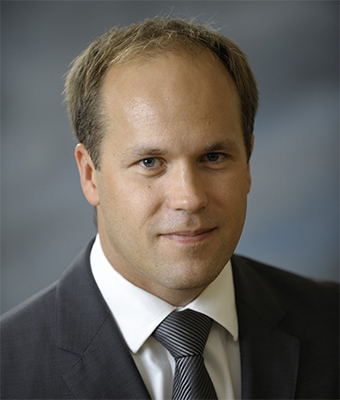Oct 8, 2024
Mathias Kronlund both ‘new’ and ‘returning’ faculty member
It may be unusual to be a new faculty member and a familiar face at Gies Business at the same time. So you may be forgiven for thinking Mathias Kronlund, associate professor of finance, has already been here a long time. Kronlund was a faculty member at Gies from 2012-2020, after which he spent four years at Tulane University before finding his way back to Gies this year.
What brought him back? “The main reason is the people and the culture,” he said. “I know most of the faculty. Even the faculty who joined after I left, I feel I know quite well. I think it’s just a good community of scholars and teachers. People help each other. It’s an active environment.”

Born in Finland, Kronlund studied industrial engineering and software development as an undergraduate. A lot of applied math and coding projects. Before going on to his master’s degree, he was an exchange student at the University of Michigan.
“I discovered what’s called financial engineering there,” he recalled. “Pricing derivatives, for example, I thought that was really interesting. And it used the math I had already acquired and knew well. But it made me want to learn more about the finance aspect.”
The faculty there encouraged his interest, and suggested he start a PhD program in finance. Kronlund went on to get an MBA and PhD from Booth School of Business at the University of Chicago.
Kronlund has two main research interests: corporate finance and bond markets. A recent research project looked at what he calls “growth-promoting bonuses” (GPBs) and the impact these can have on the decision-making process for company executives. GPBs are those bonuses that are directly tied to the firm’s growth in some way – it could be sales, production, or market share. Because this growth can result from acquiring other companies, these bonuses can drive company managers to acquire companies to hit whatever target they have for their bonus.
In fact, that is what Kronlund and his colleagues found. Firms are much more likely to make acquisitions when executives have targets for their GPBs that they want to hit. They also found in acquiring these new firms, the acquiring firm (with the GPB) had lower returns around the acquisition announcements compared to when other firms made acquisitions. This destruction of shareholder value seemed to be primarily due to the selection of targets with less value-adding synergies.
“I think what was surprising to us about this research was just the fact that these deals were this bad,” Kronlund said. “You would have thought that the firms that have these contracts that reward growth really need to grow and so it would be good for them to grow. But it turns out that the kind of growth they are getting is actually not good for them.”
Kronlund will be bringing his financial expertise to the classroom this fall with FIN 321: Advanced Corporate Finance, and FIN 552/592, a new course for PhDs and advanced master’s students on empirical investments and asset pricing. And Kronlund is passionate about his teaching. “I’m in this because I want to help young people succeed in their careers,” he said. “It reflects our land-grant mission – you can have an impact, and you see that impact on students’ lives”.
Overall, this year will be an exciting, enjoyable one for Kronlund: “I am excited to be back. There is nothing like returning to the good friends and colleagues that we have many of here at Illinois.”
